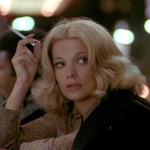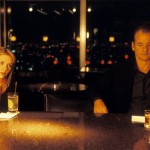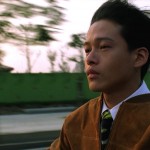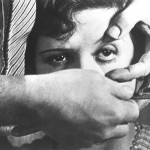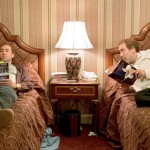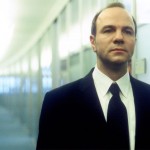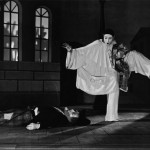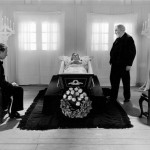This essay was orignally published at Senses of Cinema.
– – –
The River (1997), Tsai Ming-liang’s third feature-length film, opens with a static shot of a vacant, two-way escalator. After twenty seconds or so of silence—the diegetic drone of the escalators is the only sound we hear—a young woman begins her descent down the left side as a young man climbs to the right. They share an unexpected glimpse of recognition in passing, then turn toward each other, their bodies still being pushed in opposite directions. It’s a paradigmatic instance of Tsai’s storytelling: a nearly wordless exchange between two souls who are, paradoxically, isolated among Taipei’s six million inhabitants and drawn together/pulled apart by its contemporary, technological landscape. That the woman, upon reaching the lower level, immediately turns and ascends back to where her old friend awaits, suggests the possibility of grace—even if fleeting—that bleeds through so much of Tsai’s otherwise bleak and alienating vision. In his world of water-soaked apartments, anonymous sexual encounters, mysterious and catastrophic disease, and desperate loneliness, Tsai clutches tightly to a strange and joyful faith in the potential for genuine human communion, a communion that is rare indeed but occasionally worthy of the effort.
Born and raised in Kuching, Malaysia, Tsai Ming-liang was introduced to movies by his grandparents, who often took him to screenings of popular films from China, Taiwan, India, Hong Kong, America, and the Philippines at any of the dozen or so cinemas that populated their small, quiet town. The son of a farmer who also operated a stall in the city center, Tsai speaks fondly of his relatively carefree childhood. “The main benefit I got from having lived there, in Kuching, for that period” he has said, “was the very slow pace of life, giving me time to develop my interests and enjoy myself.” (1) The analogies here to Tsai’s distinctive film style and narrative concerns are too rich to ignore. Even by the standards of his New Taiwanese Cinema contemporaries, Hou Hsiao-hsien and Edward Yang, Tsai’s films are, as some would say, deliberately paced. Cutting together long takes, often of static medium and long shots, he unabashedly requires each viewer to slow down and patiently experience another’s life, thereby avoiding the dictatorial imposition of classical continuity editing that would lead inevitably, in the words of Andrei Tarkovsky, to “a facile interpretation of life’s complexities.” (2) Instead, Tsai’s camera lingers near his subjects in an almost documentary fashion, observing their behavior with relative objectivity, just as the director himself came of age freely observing and admiring the slow movements of Malaysian life.
At twenty, after finishing high school and becoming “a bit of a gigolo”, Tsai left Kuching at his father’s prodding and resettled in Taiwan, where he entered Taipei’s Chinese Culture University to study film and drama. (3) There, he was first exposed to European cinema and, specifically, to auteurs such as Truffaut, Fassbinder, Bresson, and Antonioni, the four filmmakers to whom Tsai is most often compared. “I think European films are closer to me because they are about modern life and ordinary, modern men,” Tsai told Nanouk Leopold. “And I have the idea they are more realistic, true to life.” (4) Although cataloguing their particular influences might be a tad reductive, the contributions of each director to Tsai’s style is clear: Truffaut’s sweet humanism; Fassbinder’s loyal troupe of collaborators, along with his gender and sexual preoccupations; Bresson’s precise attention to the bodies of his non-professional actors; Antonioni’s alienating urban landscapes. For Tsai, the films of the Nouvelle Vague and the New German Cinema, in particular, were convincing evidence of film’s potential as a vehicle for personal expression. He emerged from that experience with a new enthusiasm for the film director as a guiding and influential artistic voice.
Tsai graduated from the university in 1982, an interesting moment in Taiwan’s recent history. Three years after America first enacted the Taiwan Relations Act—which formally recognized the People’s Republic of China and severed official diplomatic ties with Taiwan—but five years before the decades of marshal law were finally brought to an end, Taiwan was in a state of flux, moving slowly but progressively toward democratization (which it would finally achieve fully in 1996 with the election of President Lee Teng-hui). For Taiwan’s emerging generation of artists and filmmakers, that social and political flux resulted in greater access to alternate sources of financing and a renaissance of independent filmmaking. Tsai immediately began work in the theater, where he staged four original plays, including A Wardrobe in the Room (1983), a one-person show in which Tsai himself starred. The drama concerns a young man who voluntarily isolates himself from the city that surrounds him, a motif that would later come to dominate Tsai’s films. He also busied himself by writing screenplays for film and television, work that led to his first significant experiences behind the camera.
Between 1989 and 1991, Tsai wrote ten teleplays, eight of which he also directed, either in whole or in part (this according to the appendix of Tsai Ming-liang, published by Editions Dis Voir in 1999, the only existing book-length study of the director). Tsai now views that period as a fundamental apprenticeship during which he found his voice as a director. There, for instance, he first discovered the remarkable tensions created by mixing professional actors with amateurs, and there he also first explored the use of documentary technique in narrative films. Unfortunately, Western audiences have had precious few opportunities to see Tsai’s early work. Only two of the television films were included in a recent touring retrospective (2002). Chris Fujiwara has described the first, All the Corners of the World (1989), as “a study of a family of movie-ticket scalpers [that] provides early drafts of images and situations that will recur in Tsai’s films, including a roller-rink scene, motorbike vandalism, an elevator ride in a love hotel, and a mannequin floating in water.” (5) The other, Boys (1991), is most notable for introducing the talents of Lee Kang-sheng (aka Hsiao-kang), who has gone on to star in each of Tsai’s features.
Along with the various teleplays, Tsai was also at work on the script for his first feature, Rebels of the Neon God (1992), which he describes as an attempt to “make a feature that was even more documentary, even more real, about everyday life in Taipei.” (6) The story of a disenchanted youth (Lee) who drops out of school after becoming obsessed with a local petty criminal (played by Chen Chao-jung), Rebels introduces what have since become the hallmarks of Tsai’s style: a preoccupation with the fractured nuclear family, which is explored onscreen by Lee, Miao Tien as his father, and Lu Hsiao-ling as his mother, all of whom return in nearly identical roles in The River and What Time Is It There? (2001); an attention to the rootless nihilism of Taipei’s youth; the juxtaposition of contemporary mores and traditional Eastern religion, most often enacted in the mother’s ceremonial adherence to Buddhist ritual; an interest in sex as an immediate but ultimately unsatisfying act of catharsis; and a symbolic obsession with water.
Rebels also exemplifies Tsai’s distinctive approach to narrative, which deliberately exploits and subverts traditional notions of dramatic tension. In one sequence, for instance, Lee trails Chen and his partner-in-crime into an arcade, where the two young thieves force open video games to steal their motherboards. When the boys complete their job and escape from the arcade, Lee is left alone, locked in for the night, waiting to be discovered. Tsai employs standard continuity editing here—cross-cutting from a shot of Lee asleep on the arcade floor to another of a security guard arriving for duty—but he then elides the expected confrontation and deflates the scene’s tension by cutting to a shot of Lee walking safely down a Taipei street. Later, we see Lee alone in his bedroom, posed with a handgun in his outstretched arms. But, again, the expected violence never materializes, or at least not as Tsai had led us to imagine it. Instead, like Brecht’s Verfremdungseffekt, his films turn viewers into self-conscious observers of strange, complex behavior—less stereotypically cinematic, more unpredictably human.
In Vive l’amour (1994), Tsai’s follow-up, Lee and Chen return, this time as street vendors who are drawn together by a vacant, upscale apartment and the young realtor, May Lin (played by Yang Kuei-mei, another of Tsai’s regulars), who fails repeatedly in her attempts to rent it. The film ends with two stunning sequences that illustrate all that makes Tsai’s vision so fascinating. In the penultimate scene, Hsiao-kang crawls into bed with Ah-jung (Chen), who is sleeping soundly. Tsai’s camera lingers on the two men for several minutes, forcing us to watch—trapped in a moment of almost Hitchcockian suspense—as Hsiao-kang leans closer and closer, finally kissing the other on the mouth without waking him. It’s a remarkable performance. Lee’s face is written with conflicted emotion: curiosity, terror, longing, shame, joy. Tsai then cuts to his heroine, who is now walking quickly and alone through a park that is muddied by construction. She wants only to put some distance between herself and Ah-jung’s bed, from which she has recently escaped quietly after another night of anonymous sex. May Lin finally rests at an outdoor amphitheater, where she sits and begins to cry. Typical of the director’s style, Tsai frames her in a medium close-up, then simply allows the camera to run. The shot lasts for five and a half minutes, during which May Lin struggles to find composure. But she is able to do so only temporarily before surrendering, again and again, to the sobs. As Dennis Lim has said of the scene, Tsai fades to black “just as you’ve convinced yourself she could go on weeping forever.” (7)
The River is Tsai’s bleakest film and also his most explicitly transgressive. After the escalator scene described above, Hsiao-kang accompanies the young woman to the set of a movie on which she is working, where he volunteers to float lifelessly in the Tanshui river, imitating a corpse. The remainder of the film concerns his and his family’s attempts to cure him of a mysterious neck pain that becomes progressively debilitating in the weeks that follow his swim. As in The Hole (1997), in which Taipei is plagued by a millennial health epidemic, here Tsai explores the emotional and psychological resonances of an inexplicable pain that carries both symbolic and corporal weight. Lee’s neck condition acts, first, as a metonymic manifestation of other ails, chief among them the collapse of the family, which in many of Tsai’s films stands in as a microcosm of contemporary society. The River dissects the traditional nuclear family with brutal frankness, culminating in a complex and difficult, but undeniably brilliant scene that shocks viewers into confronting the consequences of dishonest living, failed communication, and psychic alienation.
But Tsai refuses to slip completely into allegory here, denying us the safety of symbolic distance. Lee’s pain, instead, is always present, always excruciatingly real. In that sense, Tsai’s camera is like the Naturalist’s pen—like Flaubert’s and Zola’s—observing (almost clinically) bodies, faces, and superficial behaviors in an attempt to explain something of the human experience. In Vive l’amour Tsai first began “researching” his characters in isolation, a conceit that he develops further in The River before taking it to extreme lengths in The Hole. “That’s why I like filming bodies in these solitary situations so much,” he has said, “because I think that a person’s body only really belongs to them when they are alone.” (8) Thus, Tsai’s films are populated with shots of the mundane rituals of life—isolated characters eating, pissing, watching television, masturbating, smoking, working, mopping up spills, crying. At one point in The River, Lee sits alone on a hallway bench, where he is finally overcome by the burdens of pain. As in the final shot of Vive l’amour, we are left to watch helplessly as he convulses and, in exasperation, rocks his head into the wall behind him. Here and elsewhere, Lee is the ideal subject for Tsai’s experiments. His slow movements and measured expressions make him something of a Tarkovskyan figure, one who is “outwardly static, but inwardly charged with energy by an overriding passion.” (9)
Lee’s body is also on remarkable display in The Hole, in which he and Yang Kuei-mei perform a cinematic dance—quite literally in places—that blends slapstick comedy with profound pathos. Part of the seven-film “2000 Seen By…” series, The Hole marked Tsai’s return to features after the 1995 documentary, My New Friends, a portrait of two HIV-positive men. Perhaps reflecting that documentary experience, The Hole is set in the final days of 1999, when an enigmatic virus forces the government of Taiwan to quarantine large sections of Taipei. Lee and Yang remain, however, and their lives become entwined after a utility worker drills a hole through the floor that separates their apartments. In many ways, The Hole marks a significant departure from the films that preceded it. While Tsai’s central thematic concern (urban alienation) and his palette of symbols (water, in particular) remain on prominent display, The Hole offers portents of grace and promise that are only hinted at in his previous work. Tsai deviates most radically here in his use of fantasy-fueled musical dance sequences that meld nostalgia—harkening back to the popular Hong Kong films of his youth—with playful irreverence. Typically, Tsai eschews musical scores so as to not “shatter the reality” of his cinematic worlds. (10) The Hole, however, has only one foot in reality from the outset; the other is firmly planted in Yang’s and Lee’s projected desires (which, by the way, are awfully fun to watch).
The Hole is also a significant departure for Tsai in that the film’s simple plot—two neighbors pine away in isolation, perpetually separated by an artificial barrier—necessarily eliminates any possibility of the two leads having sex. Sex is an appropriately complicated issue in all of Tsai’s other films, which prominently feature impersonal and unfulfilling sexual encounters. Dennis Lim suggests that, in comparison with the films of his more explicitly political Taiwanese contemporaries, Tsai’s are more concerned with “personal fumblings—often stemming from romantic longing and sexual confusion.” That confusion becomes manifest in frequent one night stands, visits to gay saunas, extramarital affairs, the mimicking of pornography (which plays like a training video in the background of several scenes), and, at its most extreme, incest. In Tsai’s fourth film, however, “the hole” itself, standing as it does between Yang and Lee, becomes that obscure object of desire (and surely it doesn’t require a Freudian analyst to remark on the metaphoric implications of that hole). The film’s penultimate sequence might be the most extraordinary of Tsai’s career. In a static long shot, we see Yang crumpled on the floor of her apartment, exhausted and water-logged. From just beyond the top edge of the frame, Lee’s arm extends down toward her. She notices and reaches for it; they make contact, and he pulls her up, presumably into his life. Such a simple, fairy tale-like image, but, especially given the context of his otherwise dystopian vision, that moment of communion breathes unexpected optimism and life into Tsai’s oeuvre.
In What Time Is It There?, Tsai’s most recent feature, that promise remains, though tempered somewhat by the pains of tragedy and loss. The film is, in many ways, the logical culmination of his career thus far. Lee returns here as a Taipei watch vendor who is mourning the sudden death of his father (Miao Tien). In an early scene, Shiang-chyi (Chen Shiang-chyi), a beautiful young woman preparing for a trip to Paris, convinces Hsiao-kang to sell his own watch to her. Their brief encounter inspires in him a sense of longing, which he acts upon by systematically resetting clocks to Paris time and by watching, again and again, Francois Truffaut’s The 400 Blows (1959). While Hsiao-kang pines away in Taiwan, Shiang-chyi wanders through Parisian cafes and Metro stations, adrift in the rituals of loneliness: listening silently to the late-night sounds of an upstairs neighbor, longing for contact with random strangers. To this strange pairing, Tsai adds Hsiao-kang’s mother (again Lu Hsiao-ling, though now using the name Lu Yi-ching), a woman paralyzed by grief who also seems to find relief only through ritual, both religious and domestic.
In one of the film’s most touching scenes, the mother dresses formally for a private dinner, accompanied only by her husband’s empty chair at the table. Like Hitchcock’s “Miss Lonelyhearts”, she raises a toast to her imagined companion before breaking into tears. It’s another trademark Tsai moment: his camera again remains static throughout the long take, framing his subject in a medium long shot; the actress works alone in silence, her movements measured and deliberate. The tendency of most critics has been to reduce these signature scenes to simple meditations on Modernist dismay, but doing so too easily dismisses the honor and wonder of mourning. Hsiao-kang’s mother is not a desperate individual adrift in an irrational, alienating world (or some such cliché); instead, she is like so many of us, one who has obviously known love and companionship and now, suddenly, must make sense of loss. Tsai’s style, which is often rightfully compared to the silent cinema, frees us to experience the full brunt of attendant emotions: agony, nostalgia, despair, desire, hope. Our efforts are rewarded in full in the closing moments of the film—the most transcendent of Tsai’s career, thanks in part to Benoit Delhomme’s stunning photography and Miao Tien’s remarkable face—when that same strange beauty returns and What Time Is It There? transforms unexpectedly into a romantic ghost story and an ode to eternal love.
If Tsai’s most recent work is any indication, it is safe to assume that he will continue to poke and prod into the bodies and souls of his loyal collaborators for some time. Along with his choreographic adaptation of a play by Brecht, The Good Woman of Sezuan (1998), and a short film about religious ritual, A Conversation with God (2001), Tsai has also written and directed a 25-minute film, The Skywalk Is Gone (2002), that picks up where What Time Is It There? left off. The short film’s title refers to the actual location, now demolished, where Hsiao-kang and Shiang-chyi first meet. Noting that the short concludes with a long shot of bright blue skies, Chuck Stephens writes that the skywalk is “gone but not forgotten, even if, in its absence, heaven seems a little bit easier to see.” (11) Those blue skies—along with the rumors that Tsai will continue this story in his next feature—suggest that grace, once only a whisper in Tsai’s world, might yet take shape and become as excruciatingly real as the pain it is meant to relieve.
Endnotes
- Danièle Rivière, “Scouting: An Interview with Tsai Ming-liang”, Tsai Ming-liang, Paris, Dis Voir, 1999, p. 79

- Andrei Tarkovsky, Sculpting in Time, New York, Knopf, 1987, p. 20

- Rivière, p. 81

- Nanouk Leopold, “Confined Space – Interview with Tsai Ming liang”, Senses of Cinema, Issue 20, May–June 2002, http://www.sensesofcinema.com/contents/02/20/tsai_interview.html

- Chris Fujiwara, “Of Space and Solitude”, The Phoenix, 21 February 2002, http://www.bostonphoenix.com/boston/movies/documents/02164886.htm

- Rivière, p. 88

- Dennis Lim, “Tsai Ming-liang Opens the Floodgates”, The Village Voice, 25 June 2001, http://www.villagevoice.com/issues/0126/lim.php

- Rivière, p. 103

- Tarkovsky, p. 17

- Rivière, p. 111

- Chuck Stephens, “Eastern Division Highlights”, Film Comment, January–February 2003, p. 68.


